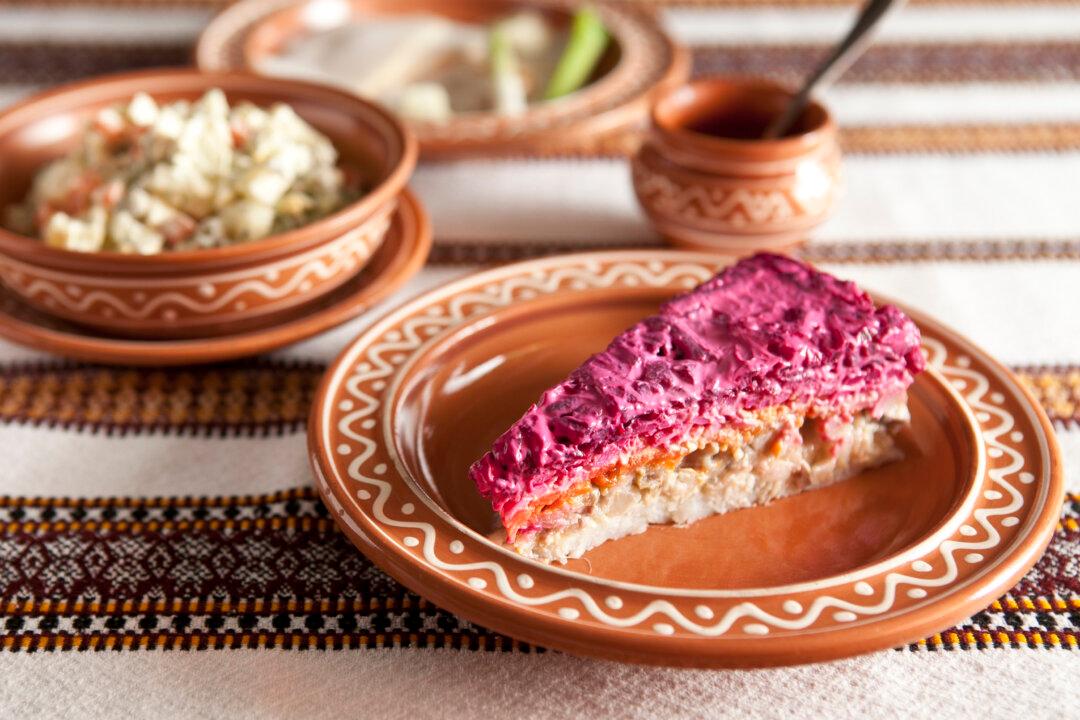Even as spring’s official date zooms by, promises of warmth and daffodils seem very far away. Every cold-weather culture has its own way of dealing with the season, and it’s as good a time as any to try out a Ukrainian approach: Lots of hearty, rustic food, intersped with shots of vodka. Or is that shots of vodka, interspersed with hearty food?
“People start with it and they end with it. It’s vodka all the time,” said Alexandra Gulova, assistant to the owner of Korchma Taras Bulba, whose first U.S. outpost opened in SoHo last June.
“Korchma” means “tavern,” and at Taras Bulba, the 20-plus vodkas, which come in salty, sweet, and even spicy flavors, are made in-house. Horseradish and cranberry are popular.
Among its many uses, vodka is an antifreeze of sorts, but it is traditionally used for healing. Feeling under the weather? Take two shots, go to bed, sweat it out, and wake up well.
Korchma Taras Bulba was founded in 1999 by Ukrainian Yuri Beloyvan at a time when the Moscow dining scene was bleak and rife with fast food joints. (Incidentally, the hottest thing around these days is sushi, said Gulova). Another 16 locations are in Moscow, and one is in Kyiv. The “korchma” or “tavern” is named after Taras Bulba, a Ukrainian Cossack character created by Nikolai Gogol. Hollywood immortalized him in a 1962 film starring actor Yul Brynner.
The restaurant aims to give an experience that’s traditionally Ukrainian, from food to the drinks to the ambiance, in essence what you would find if you were to drop by your Ukrainian grandmother’s house in the country.
The dining room is crammed with mementos from Ukraine; everywhere you look there are timeworn artifacts from field and home—horseshoes, bells, jars of pickles, lanterns, old photographs—all for sale.
There are bursts of color everywhere, from tapestries to the waiters and waitresses’ own traditional garb, in particular the beautiful embroidered shirts and the colorful flower garlands worn by women. A cozy space upstairs features working fireplaces, with hand-painted Hutsul ceramic tiles, from the Carpathian mountains, each piece hand-painted and unique.
Hearty Food
I dined at Taras Bulba with a Ukrainian friend who ooh-ed and aah-ed over many of the dishes and how they reminded her of her grandmother’s cooking. But for someone who is not familiar with the cuisine, it all comes as a new experience.
Take the shuba salad, for example ($12). Otherwise known as “cured herring under a vegetable coat,” it’s a multi-layered construction, composed of layers of herring, roasted carrots, beets, potatoes, boiled eggs, and mayo. Take a mouthful, but make sure to include a bit of each layer. Salty and sweet intermix pleasantly, in a way that’s much different from the salty-sweet in Thai or Japanese cuisines. It’s a dish that can tend to be too salty, because of the salted herring, but the version here is well-balanced.
The ingredients are simple and rustic, attuned to the agricultural bounty as well as rhythms. In many dishes, sour cream ties it all together—add it to your borscht or dip in your pierogies or even sour cherry dumplings. If it all starts to seem like too much cream or fat, remember that it serves to stave off getting drunk too fast.
Without a refrigerator, curing and preserving also become paramount.
“Everybody had pigs, everybody had potatoes,” said Gulova.
To me, if anything felt foreign to the point of thinking it had to be an acquired taste, it was the salo, thin slices of cured pork fatback ($13 for an assortment, dusted in paprika, pepper, or served plain).
Eaten with rye bread, and sometimes rubbed with a bit of garlic clove, it is one of the dishes Ukraine is known for. The salo and the smalets (or melted salo, with spices) were much relished by my Ukrainian dining companion.
The borscht was wonderfully warming on a cold winter night, its orange and pink hues strangely summery, but redolent of long-simmered beets, sweet peppers, and cabbage. An additional dollop of sour cream turns the whole soup creamy.
The baked perogies, encasing fillings of meat, potatoes and mushrooms, or cabbage are simple and good ($3 each). Don’t even think of using a knife and fork to eat them. Like most of the other items at Tara Bulbas, these are made in-house.
A pickled vegetable platter ($14) with tomatoes, cucumbers, sauerkraut, cauliflower, and apples makes for a tangy side dish.
Anyone who can’t get enough of cream should try the veal stew in a clay pot ($21), with potatoes, mushrooms, sweet peppers, with oodles of sour cream.
If salad is more your speed, or you happen to be a vegan or vegetarian running with meat-lovers, try the vegetable vinegret ($9), a refreshing beet salad, with potatoes, carrots, white beans, and sauerkraut, first created in the kitchen of Alexander I.
The homemade cakes are worth leaving room for, from a finely-layered honey cake ($9); or the sour cream cake (what else?), with layers of cocoa cake and sour cream frosting ($10).
Finally, before you hit the road, you'll likely be offered a parting shot of vodka—good insurance against the cold.
Korchma Taras Bulba
357 West Broadway
212-510-7510
tarasbulba.us
Hours
Sunday–Thursday: 10:30 a.m.–11 p.m.
Friday & Saturday: 10:30 a.m.–midnight





